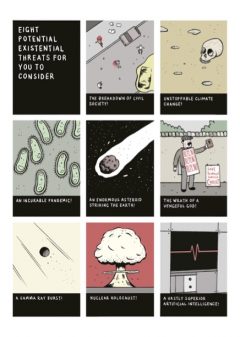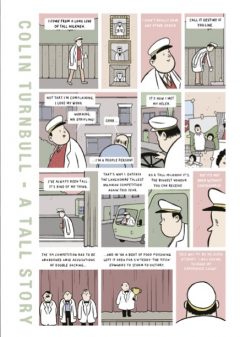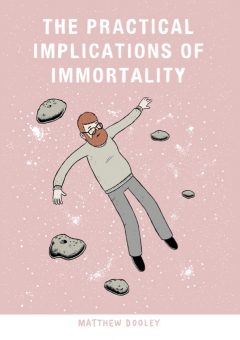“I like to put myself in absurd narratives and take them to their logical endpoint” Matthew Dooley gives us a glimpse into the Practical Implications of Immortality
 Last year was a banner year for cartoonist Matthew Dooley as he released his excellent collection Meanderings, but also scooped the prestigious Observer/Jonathan Cape/Comica Graphic Short Story prize as a result. The story that won him the prize was a tale about a tall milkman and is the centrepiece in his latest collection Practical Implications of Immortality, alongside sweary birds and auto-biographical stories that literally see him laid bare – so we decided to find out more about his unique world view.
Last year was a banner year for cartoonist Matthew Dooley as he released his excellent collection Meanderings, but also scooped the prestigious Observer/Jonathan Cape/Comica Graphic Short Story prize as a result. The story that won him the prize was a tale about a tall milkman and is the centrepiece in his latest collection Practical Implications of Immortality, alongside sweary birds and auto-biographical stories that literally see him laid bare – so we decided to find out more about his unique world view.
 Your new collection Practical Implications of Immortality is out now, how do you go about assembling them, do you cherry pick the best strips you’ve produced, or do you plan the strips to match up with a theme?
Your new collection Practical Implications of Immortality is out now, how do you go about assembling them, do you cherry pick the best strips you’ve produced, or do you plan the strips to match up with a theme?
Matthew Dooley: I wish I was prolific enough to be able to cherry pick! There isn’t a theme so much as the strips indicate the sorts of things I’ve been thinking about whilst writing it. That’s perhaps why there is a little more existential angst than my last collection. At the moment I spend far too much time reading about ways mankind could be obliterated.
You’re a regular in the likes of Dirty Rotten Comics, have these stories appeared in print before or are they completely new?
MD: Apart from a strip which had appeared in Dirty Rotten Comics #9 and my entry for last year’s Jonathan Cape competition, all these strips appear here for the first time.
How has appearing in anthologies like these helped your career compared to producing books yourself?
MD: They have helped enormously. Dirty Rotten Comics #3 was the first time I saw my work in print. That was a big deal for me and I suspect many of creators found in the pages of Dirty Rotten Comics would be in the same boat. I think their inclusive and broad submissions policy has been a real positive force in the small press scene over the last few years. If I was offering any advice to anybody who wanted to start making comics I would direct them to Dirty Rotten Comics.
 Some of the stories feel incredibly personal (especially the scales one where you are literally stripped down to nothing!), is it important for you to put a lot of yourself into your stories?
Some of the stories feel incredibly personal (especially the scales one where you are literally stripped down to nothing!), is it important for you to put a lot of yourself into your stories?
MD: I feel most comfortable writing in the first person. This obviously lends itself to autobiography. But my life is not an especially interesting one, at least to somebody who isn’t living it. Instead of straight autobiography I like to put myself in absurd narratives and take them to their logical endpoint. So, whilst there isn’t anything in the book that has actually happened, I think it can tell you something about me. The decision to portray myself naked was simply because it made me laugh. Unfortunately this means that no family are allowed to buy it, cutting my sales figures in half.
Some have quite a dark, almost nihilistic edge (the existential threat strips) while some feel deliberately daft (the swearing birds, the tallest milk man), is this your attempt at making sense of the crazy world around us, or perhaps of poking fun at it?
MD: I am a pessimist. I am pessimistic about pretty much everything. There is a definite nihilistic streak in this book and I think that can be found in me too. However, I don’t want the reader to think I’m some terrible Nietzschean because I’m not. I’m fearful about the future, about how the world is going to deal with automation, populism, climate change and all the other myriad creeping dangers. On the other hand, I’m quite silly so that’s why I sometimes write about tall milkmen.
 You seem to enjoy making quite structured stories (the 8 existential threats, or the 21st century divination) are you quite an ordered person or do you just like nice ordered panels on a page?
You seem to enjoy making quite structured stories (the 8 existential threats, or the 21st century divination) are you quite an ordered person or do you just like nice ordered panels on a page?
MD: Anybody who has lived with me would attest to my constant state of disorder… I mostly live in a shambolic fog of absent mindedness.
How has winning the Jonathan Cape prize been for you? Has it helped give you freedom to tell more stories in your own way? Or has it added more pressure on for your next collection?
MD: I wouldn’t say it has put pressure on me. Winning the Cape prize has encouraged me to try and keep getting better and to put more work out there.
Your stories are quite short single idea pieces, any plans to do more long form pieces? Any you’d like to expand out perhaps?
MD: I am in the process of writing something that will be a good longer than anything I’ve attempted before… so watch this space!
You can purchase The Practical Implications of Immortality and Meanderings from Matthew’s Big Cartel Store.



December 21, 2025 @ 2:58 pm
35x (Einzahlung + Bonus) +40x Gewinne aus Freispielen Budget/Zeiten begrenzen, Pausen einlegen, nur
mit entbehrlichem Geld spielen; Limits/Selbstausschluss nutzen; bei Bedarf Hilfe-Angebote
(siehe oben) kontaktieren. Zu meinen persönlichen Favoriten gehören Bücherslots wie Book of Ra und Eye of Horus.
Darüber hinaus musst du keine Anreise auf dich nehmen und kannst flexibel und anonym von Zuhause aus spielen. Dabei ist beispielsweise Novoline
der Entwickler von “Book of Ra”, einem der bekanntesten Slotspiele überhaupt.
Das bedeutet, dass Sie zuerst diese Bestimmungen einhalten müssen, wenn Sie mit einem Bonus spielen. Die verschiedensten Glücksspiel-Webseitenbieten ihrem neuen und bestehenden Spielern sehr oft Boni und andere Werbeaktionen an. Der durchschnittliche Hausvorteil liegt bei Slotspielen um die 4%, das bedeutet, dass die
Spielerinnen und Spieler durchschnittlich 4% ihres Einsatzes pro einzelner Spielrunde verlieren. In vielen modernen Slotspielen kommen bereits einige innovative Spielelemente vor, wie beispielsweise Cluster-Auszahlungen, bei denen Gewinnkombinationen durch aneinandergrenzende Symbolcluster
entstehen, oder auch viele andere erfinderische Features.
Werden diese speziellen Funktionen aktiv, so erhalten die Spielerinnen und Spieler beispielsweise Freispiele
oder andere Bonusgewinne als Belohnung gutgeschrieben. Normalerweise bestehen Online Slotspiele aus
einer bestimmten Anzahl von Walzen, auf denen die unterschiedlichsten Symbole getroffen werden können.
References:
https://online-spielhallen.de/starda-casino-promo-code-ihr-schlussel-zu-exklusiven-vorteilen/
December 26, 2025 @ 12:35 pm
The buttons for betting and gameplay are big enough that I didn’t make mistakes when tapping.
The site adjusts nicely to screen sizes, and I didn’t run into
any major issues switching between pokies and table games.
I found the mobile casino mostly solid, though it could use a few improvements.
You can play with peace of mind knowing they have proper licensing and basic player protections in place.
For more information about the full welcome offerings available at
leading casinos, check out our selection of the best free crypto sign-up bonuses with no deposit required.
The site offers a wide range of promotions and bonuses for
both new and existing players, including a generous welcome bonus and ongoing promotions such
as 30 free spins and reload bonuses. Established in 2014, Bitstarz is a cryptocurrency casino that offers
a wide range of games, including slots, table games,
and live dealer games.
New players are welcomed with a 200% bonus of up to 20,000
USDT, with a wagering requirement of 40x for
the first deposit, but the requirements drop to as low as 25x
for the fourth deposit. Another standout feature of the casino is the WSM Dashboard, where
players can quickly check how much money has been wagered across all casino games and sports betting sections.
The casino currently offers 200 free spins to every
player who deposits at least $50 (or equivalent) to their casino account.
Meanwhile, casino players can unlock 100 free
spins when depositing at least 50 USD.
References:
https://blackcoin.co/welcome-to-fuckmate-australias-favourite-online-casino/
December 27, 2025 @ 5:36 am
No deposit casino bonuses give you a chance to play casino games
with bonus funds and win some real money in the process.
Most casino bonuses – including no deposit offers – come with a set of rules and restrictions.
There are many ways to classify no deposit bonuses offered by casinos.
They usually have wagering requirements, so you’ll need to play
and win before you can withdraw. It’s a small bonus offered to you as an incentive to sign up.
The casino will match a percentage of your deposit up to a
certain amount (they’ll tell you how much beforehand).
Each one has its quirks, so it’s good to know what each
one offers before you give them a go. Still, I’ve created a step-by-step guide to ensure you don’t
miss these attractive offers.1.
These help you chip away at the wagering without burning through your spins too fast.
Here’s how to stretch that bonus balance and actually walk
away with something. Usually, only pokies count 100% toward wagering.
References:
https://blackcoin.co/ripper-casino-bonus-codes-november-2025/
December 29, 2025 @ 5:45 am
online poker real money paypal
References:
centerdb.makorang.com
December 29, 2025 @ 6:10 am
online betting with paypal winnersbet
References:
https://www.imcufideteq.gob.mx/employer/safe-online-gambling-with-paypal/